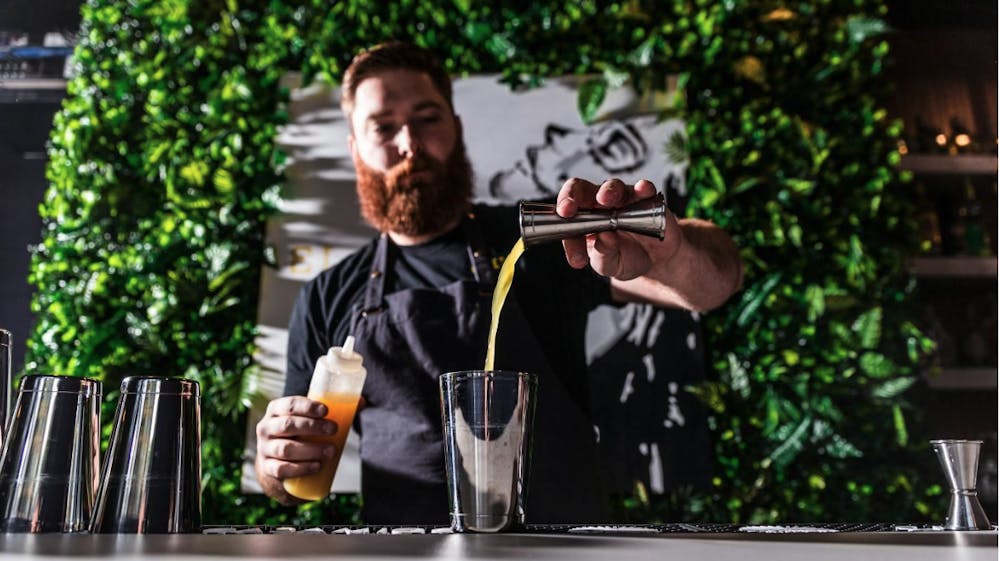While mixing drinks is undoubtedly at the heart of a bartender's role, there's a whole world of responsibilities that extend far beyond the bar counter. As someone who's spent years behind the bar, I can tell you that being a bartender is as multifaceted as it gets.
From inventory management and maintaining a clean work environment to the nuanced art of customer interaction and handling difficult situations, this post will explore the skills and duties that truly define the role.
Time to pull back the curtain and take a closer look at what makes a great bartender beyond their ability to mix a mean cocktail.
Creating Memorable Customer Experiences
One of the primary responsibilities of a bartender is to create memorable experiences for every customer who walks through the door. This involves a combination of excellent customer service skills, attentiveness, and the ability to read people.
1. Engaging with Customers
Bartenders often serve as the face of the establishment, and their demeanor sets the tone for the entire experience. I remember my early days behind the bar when I realized that a simple "How’s your night going?" could turn a casual visitor into a regular. It's these small interactions that build a loyal customer base.
2. Personalizing Service
Personalizing service can mean remembering a regular's favorite drink or noting dietary preferences. For instance, I once had a regular who was allergic to citrus. Whenever he came in, I’d prepare his favorite cocktail, ensuring it was free from any citrus ingredients. This personal touch made him feel special and demonstrated that we cared about his experience and well-being.
3. Handling Complaints and Difficult Situations
Whether it’s a wrong order or an unruly customer, bartenders need to keep their cool and resolve issues swiftly. Often, all it takes to turn frustration into satisfaction is an attentive ear and a complimentary drink.
Inventory Management
Bartenders are also responsible for managing the bar’s inventory. This means keeping track of stock levels, ordering supplies, and ensuring that nothing runs out during a busy shift. It's a task that requires organization and foresight.
4. Monitoring Stock Levels
During my tenure at a high-traffic bar, I learned to anticipate the rush on certain nights, like Fridays, when our specialty cocktails were in high demand. Proper inventory management can prevent the dreaded “Sorry, we’re out of that” moment.
5. Ordering Supplies
Bartenders often need to establish good relationships with suppliers and negotiate prices. It’s also essential to order the right amount of each item — too much and you risk waste; too little and you risk running out.
Once, I overestimated the demand for a particular craft beer because I happened to like it a lot, resulting in excess stock that eventually went to waste. Yikes!
Maintaining a Clean and Safe Environment
Cleanliness and safety are paramount in any bar setting. A tidy bar looks much more appealing, but more importantly, it ensures a hygienic environment for preparing drinks.
6. Regular Cleaning Routines
Bartenders must adhere to regular cleaning routines, from wiping down the bar and cleaning glasses to ensuring the entire area is spotless. This was drilled into me from day one: a clean bar is a welcoming bar. Plus, it helps prevent any health code violations.
7. Ensuring Safety
Safety goes beyond just cleanliness. It involves knowing how to handle and store ingredients properly, ensuring that glassware is intact, and knowing the proper emergency procedures. Glasses will shatter. The trick is to promptly clean the mess up and ensure no one steps in the area until it is safe.
Business Side of Bartending
Bartenders also play a crucial role in the financial health of an establishment. They need to be aware of pricing, upselling techniques, and handling cash and card transactions efficiently.
8. Pricing and Upselling
Understanding the pricing strategy and effectively upselling can significantly impact a bar’s revenue. Suggesting a premium brand or a larger size can subtly increase sales. This doesn’t mean being sleazy and trying to mooch your patrons for every last dollar, though.
You may, for example, recommend a top-shelf whiskey to customers looking for something special; more often than not, they’ll appreciate the suggestion and the enhanced experience.
9. Handling Transactions
Bartenders must be quick with the register and ensure every transaction is logged correctly. Mistakes can lead to discrepancies and losses. You may want to develop a habit of double-checking every transaction during busy nights to ensure accuracy.
Wrapping Up
At the end of the day, the bartender job description is multifaceted and extends far beyond mixing drinks.
From creating memorable customer experiences to managing inventory, maintaining cleanliness, and understanding the business side of operations, each responsibility plays a crucial role in the overall success of the establishment.
A great bartender is the heart and soul of the bar, bringing a personal touch to their work, making every interaction unique, and ensuring that customers leave with a positive impression.
This post is provided by a third party who may receive compensation from the products or services they mention.


